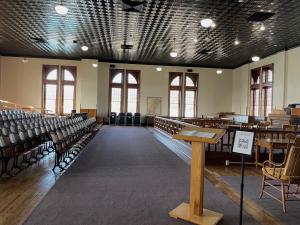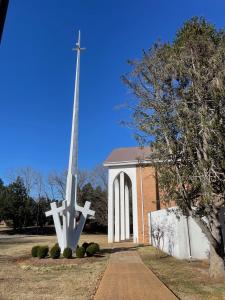The Scopes trial, one of the most famous court cases in United States history, was held one hundred years ago this month. Though it may seem irrelevant to twenty-first-century Christians, the trial in the small town of Dayton, Tennessee, had a lasting impact on the dynamics of Christianity in America.
No one was more aware of the enduring legacy of the Scopes trial than one of Dayton’s residents, the late Rachel Held Evans. Evans moved to Dayton in 1994, where she began eighth grade. The family, including her parents and her sister, moved when her father, a professor and administrator, began a position at Bryan College. Every year, as it still does today, the town put on a Scopes trial reenactment in the preserved courthouse. For many years, Clarence Darrow was played by one of Evans’s high school friend’s father, a local actor, who also directed the play. Evans’s first book, Evolving in Monkey Town (later renamed Faith Unraveled), published in 2010, framed her faith journey as a departure from Dayton’s predominant fundamentalist Christianity, including belief in young-earth creationism.

Learning About and Living Out Scopes’ Legacy
Coming of age in Dayton, a town of 6,000 in the 1990s and overwhelmingly evangelical Christian, Evans absorbed the impression that William Jennings Bryan, the famous prosecutor, was the hero of the Scopes trial. According to this narrative, Bryan, though a populist Democrat and a Northerner, was the defender of the Southern Christian religion against atheistic Northern city-folk. In the 1990s, as in the 1920s, Dayton residents were sympathetic to Bryan’s cause. Bryan, a three-time presidential candidate who had not practiced law for decades, was called upon to defend the Tennessee people against the encroachment of evolutionary theory on their public education system. Bryan prosecuted the high school teacher John T. Scopes, who had agreed to admit he violated Tennessee’s recently passed Butler Act of 1925, which prohibited the teaching of evolution. The American Civil Liberties Union contracted Clarence Darrow to defend Scopes and thus challenge the proliferating state laws that prohibited the teaching of evolution in public schools. To many Southern Christians, Bryan served as champion of the “plain meaning” of the biblical text, which he believed ruled out the possibility of evolution.
Though the outcome of the trial was insignificant – The Butler Act was upheld and Scopes was fined $100, paid by the ACLU, before moving on to graduate school – the symbolism of the trial endured. The Scopes trial led the American public to equate fundamentalist Christianity with an anti-intellectual rejection of science and split the country into two factions. On one side, a fundamentalist interpretation of the Genesis story was equated with Christian morality, Southern values, and rural American life. On the other side was science, reason, industrialization, and city life. The media, especially journalist H.L. Mencken, depicted citizens of Dayton as uneducated bumpkins, referring to them using animalistic language. This critical spotlight, according to historian Angie Maxwell, triggered “defiant pride manifested by a regional inferiority complex” (The Indicted South, 3). Many people in Dayton were certain which side held the moral high ground – the “Great Commoner,” William Jennings Bryan.

As a teenager, Evans attended Rhea County High School, where John Scopes had once taught before his conviction. Though teaching evolution was no longer illegal thanks to the 1968 Supreme Court decision, Epperson v. Arkansas, many Dayton parents were relieved that science teachers routinely skipped portions of the textbooks that covered evolution (Evolving in Monkey Town, 40).
After high school, Evans graduated to Bryan College, named for William Jennings Bryan. Before Bryan died, just five days after the Scopes trial, he had noted that the hill above Dayton would be a fine place for a Christian college. The William Jennings Bryan Memorial Association began collecting funds to found a college to memorialize Bryan and his fealty to a literal reading of the Genesis text. Pledge cards and letters of support arrived from across the country, including from future president Franklin Delano Roosevelt, the president of the Alabama Woman’s Christian Temperance Union, and the secretary of the Ku Klux Klan, which felt that Bryan had been a faithful defender of the KKK’s religious freedom. Ground was broken on “Bryan Hill” in 1926.
At Bryan, Evans took a course with the charismatic creation scientist Kurt Wise. Harvard-educated and well respected by those in the scientific community – sometimes to the ire of other Young Earth creationists – Wise convinced a generation of Bryan students of the scientific viability of creationism. Evans, like many Bryan students, was compelled by Wise’s account and believed that her Christian faith required her to reject evolution and embrace a six-day creation.
Young Earth creationism was not the predominant evangelical understanding of the Genesis text before the twentieth century. While the publication of Darwin’s Origin of the Species in 1859 concerned some evangelicals in the United States, various reactions to and accommodations of the theory of evolution co-existed. Even some of the authors of The Fundamentals (1910-1915) believed in an old earth and thought that evolution might have been God’s means of creating it. Literal six-day creationism was advocated by nineteenth-century founder of Seventh Day Adventism Ellen White, whose visions had revealed it to her, and was adopted by other Protestant Christians who opposed Darwin’s theory. Whereas early Christian thinkers, including Origen and Augustine, interpreted many biblical texts allegorically or figuratively, including the Genesis creation stories, some twentieth-century fundamentalists began reading Genesis as a literal account. In the mid-twentieth century, the evangelical philosopher Bernard Ramm’s book advocated a version of evolution called progressive creationism, which was widely accepted by evangelicals, including the evangelist Billy Graham. In reaction, John Whitcomb and Henry Morris published the 1961 book The Genesis Flood. This second book advocated “flood geology,” arguing that a worldwide flood in the time of Noah had created the geological features that only appeared to be millions of years old, like the Grand Canyon. This book laid the foundation for the Young Earth movement and much of the creation science that followed. Morris founded the Institute for Creation Research, still in existence today.
The fundamentalist movement that came to inflect much of conservative evangelicalism in the second half of the twentieth century adopted Young Earth creationism as an essential part of the “biblical worldview.” According to this thinking, which was popular especially in conservative Reformed evangelical institutions, a complete “biblical worldview” encompassed not only basic traditional Christian beliefs but also Young Earth creationism, patriarchal gender roles, and Republican politics. Christian Worldview thinking was taught as part of the required Bryan College curriculum and at parachurch organizations with which Evans volunteered during college.
The Specter of Scopes in Evans’ World
When Evans, in her twenties, began to doubt individual beliefs within the interlocking “biblical worldview,” this slowly unraveled her fundamentalist faith. When she heard apologists take stark positions against public schools, against feminism, and against accepted science like evolution, she began doubting the conservative evangelical cultural package. Though she did not reject Christianity as a result, she worried her millennial peers would.

Evans took the position that Young Earth creationism should not be taught as essential to the Christian faith, lest young Christians be pushed away from the church by this viewpoint. In a 2010 blog post on her eponymous blog Rachel Held Evans, she wrote, “I’ve watched in growing frustration as this false dichotomy has convinced my friends to leave the faith altogether when they examine the science and find it incompatible with a 6,000-year-old earth. Sensing that Christianity required abandoning their intellectual integrity, some of the best and brightest of the next generation made a choice they didn’t have to make. The reason I speak out about this issue is not because I am passionately committed to the theory of evolution; it’s because I am passionately committed to the fact that it’s not worth leaving the faith over! ” [ Bold in original] (“A Response to Ken Ham: Let’s Make Peace”). She worried that the media-driven association between Christianity and a rejection of accepted science during the Scopes trial would continue to haunt Christians in the twenty-first century. She recommended that Christian colleges like Bryan teach evolution as part of its science curriculum.
Evans’ warning went unheeded. In 2014, Bryan College doubled down on its tradition of resisting evolution by requiring all faculty members to sign a statement affirming the historicity of the Genesis figures Adam and Eve. Some faculty and trustees left of their own accord. Others were fired when they refused to sign. In 2017, Bryan College awarded an honorary degree to Ken Hamm, founder of the Creation Museum in Kentucky. The anti-evolution stance at the college has become narrower in the twenty-first century. William Jennings Bryan himself, though a creationist in the sense that he believed God created the earth and human beings, did not hold a Young Earth position.
As Rachel Held Evans’s faith publicly evolved on her blog and in her books, she led a growing group of millennial and Generation X readers who were also reconsidering components of their Christian faith. Despite her disagreements with some of the culturally dominant views of her fellow Daytonians, Evans was fiercely loyal to Dayton. Even as she became a New York Times bestselling author and a well-known Christian voice on Twitter, she remained in the small town, nicknamed “Monkey Town.”
 Kelsey Hanson Woodruff earned her Ph.D. in Religion from Harvard University in May 2025. She is currently writing a biography of Rachel Held Evans for Eerdmans Publishing.
Kelsey Hanson Woodruff earned her Ph.D. in Religion from Harvard University in May 2025. She is currently writing a biography of Rachel Held Evans for Eerdmans Publishing.












